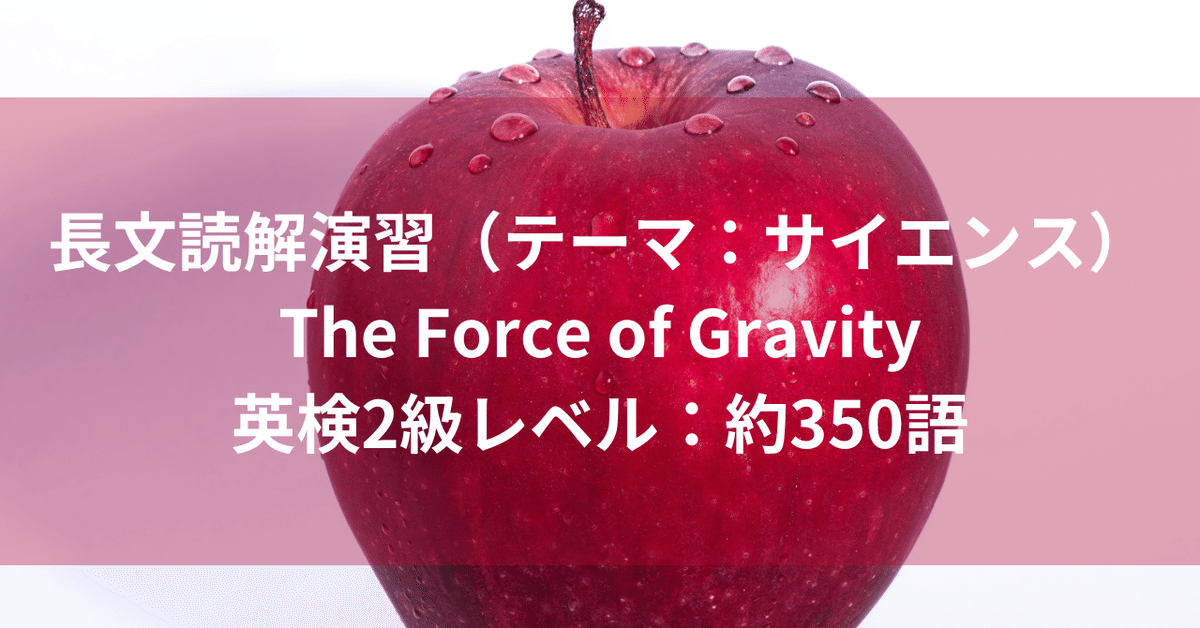
毎日5分!英語力をぐんぐん伸ばす長文読解チャレンジ(テーマ:サイエンス)
以下に、「重力」をテーマにした、英検2級レベルの長文を作成しました。2〜3分で読み切れる文量で、単語や文法のポイント、日本語訳、内容に関する問題と模範解答も含めています。
※この長文の単語数は 351語 です。
The Force of Gravity
Gravity is one of the most fundamental forces in the universe. It is the force that pulls objects toward each other. The stronger an object’s mass, the stronger its gravitational pull. Gravity keeps us on the ground, makes planets orbit the sun, and even affects the motion of galaxies.
The English scientist Sir Isaac Newton was the first to explain how gravity works. According to Newton’s theory, every object in the universe attracts every other object with a force called gravity. This force depends on the mass of the objects and the distance between them. The larger and closer two objects are, the stronger the gravitational force between them.
How Gravity Affects Our Lives
On Earth, gravity gives us weight. Our weight is the result of the Earth’s gravity pulling us toward its center. If you were on a planet with less gravity than Earth, such as the Moon, you would weigh less. In fact, on the Moon, you would weigh only about one-sixth of your weight on Earth. This is why astronauts on the Moon seem to float as they move.
Gravity also plays a key role in keeping the planets in orbit around the Sun. Without gravity, the planets would fly off into space. The gravitational pull of the Sun is strong enough to keep the planets in their orbits, even though they are millions of kilometers away. Similarly, the Moon’s gravity affects the tides on Earth, pulling on the oceans and causing the rise and fall of sea levels.
Einstein’s Theory of Gravity
In the early 20th century, the famous physicist Albert Einstein developed a new theory of gravity. According to Einstein’s theory of general relativity, gravity is not just a force but also a result of the way mass and energy bend space and time. This idea revolutionized our understanding of the universe and has been confirmed through many experiments, such as observing how light bends when passing near a massive object like a star or a black hole.
Gravity is an essential part of how the universe functions, and scientists continue to study it to learn more about the mysteries of space and time.
Vocabulary and Grammar Points:
Mass (質量) – The amount of matter in an object.
Example: "The stronger an object’s mass, the stronger its gravitational pull."
Orbit (軌道を回る) – To move around a planet or star in a curved path.
Example: "Gravity keeps the planets in orbit around the Sun."
Force (力) – A push or pull that can cause an object to move, stop, or change direction.
Example: "Gravity is the force that pulls objects toward each other."
Relativity (相対性理論) – Einstein's theory that describes how space and time are affected by gravity.
Example: "Einstein’s theory of general relativity changed our understanding of gravity."
Tide (潮) – The regular rise and fall of the sea level caused by the Moon's gravity.
Example: "The Moon’s gravity causes the tides on Earth."
Questions :
Who was the first scientist to explain gravity?
What happens to your weight if you go to the Moon?
How does gravity affect the planets in the solar system?
What is one difference between Newton’s and Einstein’s theories of gravity?
What role does the Moon’s gravity play on Earth?
Sample Answers (模範解答):
The first scientist to explain gravity was Sir Isaac Newton.
Your weight would be about one-sixth of your weight on Earth.
Gravity keeps the planets in orbit around the Sun.
Newton saw gravity as a force, while Einstein's theory suggests that gravity results from the bending of space and time.
The Moon’s gravity causes the tides on Earth, making the sea levels rise and fall.
Japanese Translation (日本語訳):
重力は、宇宙で最も基本的な力の一つです。重力は物体同士を引き寄せる力であり、物体の質量が大きいほど、その引力も強くなります。重力のおかげで私たちは地面に立つことができ、惑星は太陽の周りを回り、銀河の動きにも影響を与えます。
イギリスの科学者、アイザック・ニュートンが初めて重力の仕組みを説明しました。ニュートンの理論によれば、宇宙のすべての物体は重力という力でお互いを引きつけます。この力は物体の質量とその距離に依存します。物体が大きくて近いほど、その間の引力は強くなります。
重力が私たちの生活に与える影響
地球上では、重力が私たちに「重さ」を与えています。私たちの体重は、地球の重力が私たちを中心に引っ張っている結果です。もし地球よりも重力が弱い惑星、例えば月に行けば、私たちの体重は軽くなります。実際、月では地球上の約6分の1の重さになります。このため、月面を歩く宇宙飛行士は、浮いているように見えます。
重力はまた、惑星が太陽の周りを回り続けるための重要な役割を果たしています。もし重力がなければ、惑星は宇宙へ飛び出してしまうでしょう。太陽の引力は非常に強いため、数百万キロ離れた惑星もその軌道を保っています。同様に、月の重力は地球の潮汐に影響を与え、海の水位の上昇と下降を引き起こします。
アインシュタインの重力理論
20世紀初頭、有名な物理学者アルバート・アインシュタインが、新しい重力の理論を発表しました。アインシュタインの一般相対性理論によれば、重力は単なる力ではなく、質量とエネルギーが時空を曲げる結果として現れるものです。この考え方は、宇宙の理解に革命をもたらし、星やブラックホールの近くを通る光が曲がる現象など、多くの実験で確認されています。
重力は、宇宙がどのように機能するかを理解する上で欠かせない要素であり、科学者たちは今もなお、宇宙や時空の謎を解き明かすために重力を研究し続けています。
この記事が気に入ったらサポートをしてみませんか?
